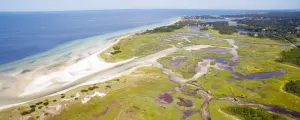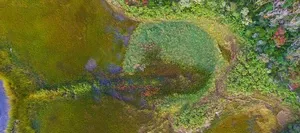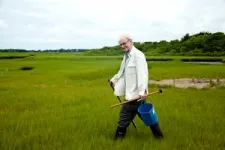WOODS HOLE, MASS. -- Cape Cod’s salt marshes are as iconic as they are important. These beautiful, low-lying wetlands are some of the most biologically productive ecosystems on Earth. They play an outsized role in nitrogen cycling, act as carbon sinks, protect coastal development from storm surge, and provide critical habitats and nurseries for many fish, shellfish, and coastal birds.
And, according to new research from the Marine Biological Laboratory (MBL), more than 90 percent of the world’s salt marshes are likely to be underwater by the end of the century.
The findings come from a 50-year study in Great Sippewissett Marsh in Falmouth, Massachusetts. Since 1971, scientists from the MBL Ecosystems Center have mapped vegetative cover in experimental plots in this marsh to examine whether increased nitrogen in the environment would impact species of marsh grass. Due to the study’s length, they also were able to detect the effects of climate change on the ecosystem, especially those driven by accelerating sea level rise.
The researchers found that increased nitrogen favored higher levels of vegetation and accretion of the marsh surface, but that no matter what the concentration of nitrogen they applied to the marsh, these ecosystems won’t be able to outpace submergence from global sea level rise.
“Places like Great Sippewissett Marsh will likely become shallow inlets by the turn of the century,” says MBL Distinguished Scientist Ivan Valiela, lead author of the study. “Even under conservative sea level estimates…more than 90% of the salt marshes of the world will likely be submerged and disappear or be diminished by the end of the century.”
“This is not a prediction from isolated scientists worried about little details. Major changes are going to be taking place on the surface of the Earth that will change the nature of coastal environments,” says Valiela.
An Ecosystem Engineer Salt marshes are gently sloping ecosystems and their plants have very narrow preferences for the elevations in which they can grow. Different species grow in the upper elevations (high marsh) versus the low elevation closer to the ocean (low marsh) and have different responses to changes in nitrogen supply. When change happens slowly enough, the grasses can migrate to their preferred elevation.
In the low marsh, cordgrass (Spartina alterniflora) prospered as scientists increased the nitrogen supply. Among high marsh species, the abundance of marsh hay (Spartina patens) in the experimental plots decreased with sea level rise. Saltgrass (Distichlis spicata) increased with nitrogen supply and also acted as what the researchers called an "ecosystem engineer"—increasing the rate at which marsh elevation rose. Accretion of biomass left behind by the decomposing saltgrass compensated for the increased submergence resulting from rising sea level in these areas.
"Saltgrass disappeared after a few decades, but it left a legacy behind,” says MBL Research Scientist Javier Lloret, adding that it was “extremely cool to see that interaction in the dataset.”
Regardless of how much nitrogen was added to the environment, the research showed that at the current and future forecasted sea level rise, low marsh species will completely replace high marsh species. As sea levels continue to rise, even these species will be submerged.
“At some point, if sea level continues to increase at the rates that we anticipate, there will even be no more room for the low marsh plants. They’re just going to be too submerged to survive.” says Valiela.
The only alternative would be for salt marshes to migrate landward.
A Coastal Squeeze Marshes around the world face what Lloret calls a “coastal squeeze,” where sea level rise pushes from one direction and human development pushes from the other. A seawall that may protect a home from flooding will prevent the migration of a marsh naturally moving to higher ground.
“These barriers, whether they be geographic like a hill or a cliff, or people building along the edges of the ecosystem, constrain the potential for landward marsh migration,” says MBL Research Assistant Kelsey Chenoweth. “On top of that, sea level rise is accelerating and marshes are having a hard time keeping up.”
In a sea level rise scenario like the one we’re facing, “the only solution for the plants will be to colonize new areas, to go uphill,” says Lloret. “But that migration may just be impossible in some places.”
“Sea level rise is the most important threat to salt marshes. We really need to figure out what’s going to happen to these ecosystems and learn how to prevent some of the losses from happening or try to adapt to them, so marshes can continue to play these important roles for nature as well as humans,” says Lloret.
Half a Century of Science In 1971, the scientists at the MBL Ecosystems Center had no idea they would be using their data to study global sea level rise.
“This was an experiment that started looking at one ecological control (nitrogen), and then because of the longevity of the project, we were able to add new knowledge about this major accelerating agent of global change—global sea level rise,” says Valiela.
That’s the benefit of long-term datasets like the one at Great Sippewissett Marsh.
“You’re setting a baseline to the problems that haven’t even happened yet,” says Chenoweth.
When measuring ecological processes like climate change and eutrophication, the data can ebb and flow over the course of years as the ecosystem responds to external stimuli. The changes operate on a much longer time scale than changes on other biological systems.
“To study a tree, you look at changes through seasons and you should be able to see its whole cycle. For a leaf, you look at patterns between day and night. In single cells, you look at processes that take place at the timescale of minutes or seconds … but for an entire ecosystem, we’re talking many years or decades,” says Lloret. “You need to be thinking at the scale of decades or even centuries in order to be able to see substantial changes.”
This study includes co-authors from University of Massachusetts-Dartmouth and Woods Hole Oceanographic Institution.
—###—
The Marine Biological Laboratory (MBL) is dedicated to scientific discovery – exploring fundamental biology, understanding marine biodiversity and the environment, and informing the human condition through research and education. Founded in Woods Hole, Massachusetts in 1888, the MBL is a private, nonprofit institution and an affiliate of the University of Chicago.
END







